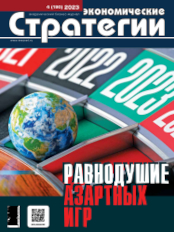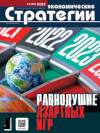DOI: 10.33917/es-4.190.2023.6-19
Different interpretations of Russia’s Special Military Operation in Ukraine, as a rule, do not reveal the systemic nature of such operations as a universal tool for resolving accumulated contradictions in the world community and critical disproportions in the global economy. In this regard, it seems necessary to give analysis of the strategic predetermination of special military operations in the world supersystem as a fundamental pattern of maintaining the controllability of society in its many manifestations at the present stage. Basically the matter is determined by new management methodology.
References:
1. Alekseenkova E.S. Reaktsiya ital’yanskoi Respubliki na spetsial’nuyu voennuyu operatsiyu Rossii na Ukraine [Reaction of the Italian Republic to the Russian Special Military Operation in Ukraine]. Analiticheskie zapiski Instituta Evropy RAN, 2022, no 1(29), pp. 63–70.
2. Batyuk V.I. Dialog mezhdu SShA i RF po probleme strategicheskoi stabil’nosti posle nachala spetsoperatsii na Ukraine [Dialogue between the United States and Russian Federation on the Strategic Stability Issue after the Beginning of the Special Operation in Ukraine]. Rossiya i Amerika v XXI
veke, 2022, no 3.
3. Belov V.B. Reaktsiya Germanii na spetsial’nuyu voennuyu operatsiyu RF na territorii Ukrainy [Germany’s Reaction to the Special Military Operation of the Russian Federation on the Territory of Ukraine]. Analiticheskie zapiski Instituta Evropy RAN, 2022, no 1(29), pp. 56–62.
4. Golovachev V.Ts., Perminova V.A. Reaktsiya Taivanya na spetsial’nuyu voennuyu operatsiyu RF na Ukraine (kratkii obzor) [Taiwan’s Reaction to the Special Military Operation of the Russian Federation in Ukraine (brief review)]. Vostochnaya analitika, 2022, vol 13, vol. 2, pp. 22–31.
5. Denisov I.P., Krasnoslobodtsev V.P., Lyubichev V.A., Raskin A.V., Tarasov I.V. Strategii informatsionnogo protivoborstva v sovremennoi voine [Strategies of Information Confrontation in Modern Warfare]. Informatsionnye voiny, 2022, no 3(63), pp. 2–5.
6. Latypov R.F. Spetsial’naya voennaya operatsiya na Ukraine: situatsionnyi analiz [Special Military Operation in Ukraine: Situational Analysis]. Ekonomika i upravlenie: nauchno-prakticheskii zhurnal, 2022, no 2(164), pp. 134–137.
7. Malinetskii G.G. Sistemnyi analiz spetsial’noi voennoi operatsii Rossii na Ukraine [System Analysis of Russia’s Special Military Operation in Ukraine]. Strategicheskaya stabil’nost’, 2022, no 3(100), pp. 22–32.
8. Mikhailenko A.N. Spetsial’naya voennaya operatsiya Rossii na Ukraine: sluchainost’ ili zakonomernost’? [Special Military Operation of Russia in Ukraine: an Accident or a Regularity?]. Voprosy natsional’nykh i federativnykh otnoshenii, 2022, vol. 12, no 4(85), pp. 1431–1448.
9. Rastorguev S.P. Informatsionnoe protivoborstvo v tselyakh i zadachakh [Information Confrontation in Goals and Objectives]. Moscow, LENAND, 2022, 304 p.
10. Orekhova A.D. Ukraina v fokuse geopoliticheskikh interesov RF i SShA: Yuzhnorossiiskoe obozrenie: Materialy Kruglogo stola [Ukraine in the Focus of Geopolitical Interests of the Russian Federation and the United States: South Russian Review: Materials of the Round Table]. Rostov n/D, Fond











